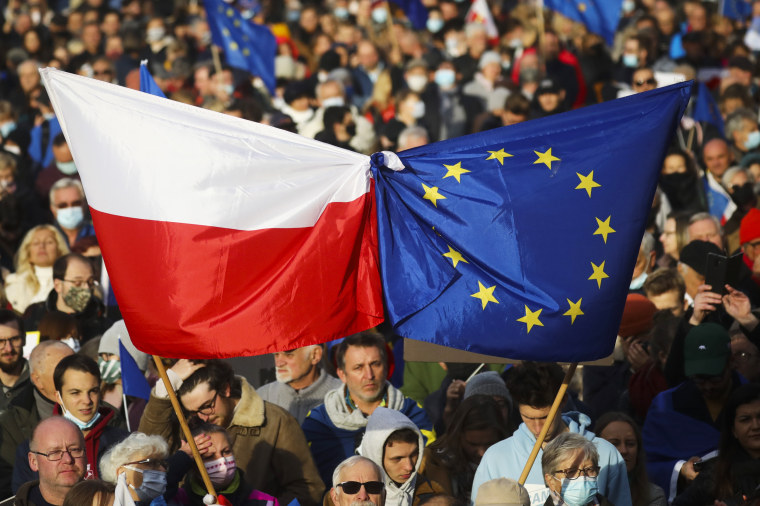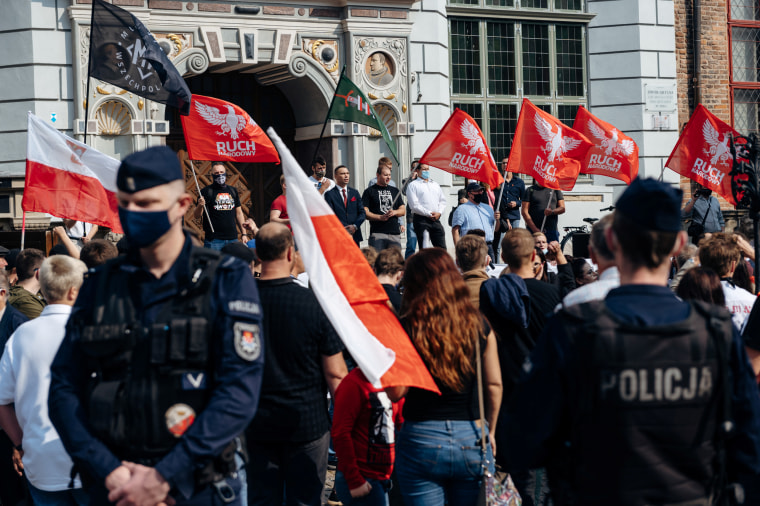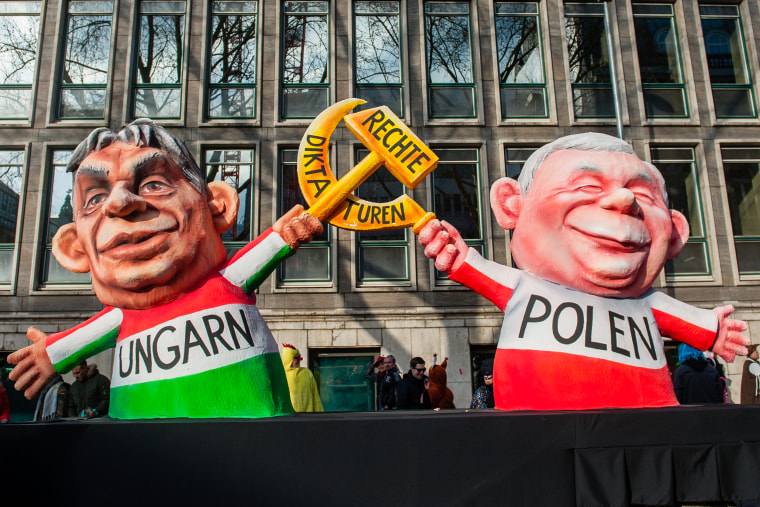LONDON — A battle is raging at the heart of the European Union over accusations that its two most right-wing governments are subverting democratic principles and offering inspiration to populist parties across Europe.
The E.U. accuses Poland of undermining the entire 27-nation union by asserting that its domestic laws take precedence over shared European law. Poland is the first member state to do so, and E.U. leaders say the move threatens the very foundations of the bloc.
More than 100,000 people across Poland took to the streets in protest in response to a ruling from the country’s top court, which declared that judges can ignore certain European Union laws and rulings. Many fear this is an initial step toward “Polexit,” or Poland’s leaving the bloc like Britain did with “Brexit.”
The E.U.’s feud with Poland is long-running and mirrors one it’s also fighting with nearby Hungary over the rule of law and President Viktor Orbán’s attempts to bring judges and courts under the control of his hard-line administration.
Both countries say they are simply acting in their national interests against a political elite that seeks to control member states.

How the E.U. fares in its fight with these two nations looks set to determine the future of democracy in Europe. And beyond Poland and Hungary, right-wing parties across the continent are tapping into public fears over immigration and identity. The huge protests on Oct. 10 across Poland came days after the country’s Constitutional Court ruled that Polish law had primacy in some areas, a direct challenge to the E.U., which requires all member nations to treat E.U. law as paramount.
A heated session of the European Parliament on Tuesday saw both sides of the debate go head-to-head with strong words and warnings on both sides.
“This ruling calls into question the foundation of the European Union. It is a direct challenge to the unity of the European legal order,” Ursula von der Leyen, head of the European Commission, the E.U.’s executive body, told the Parliament.
“This has serious consequences for the Polish people,” she said. "Without independence of the courts, people have less protection and consequently their rights are at stake.”
Judges in Poland have been driven out of office without justification, she added, part of the judicial changes E.U. leaders have been criticizing for years.
The commission is considering a number of retaliatory steps, including challenging the Polish ruling, imposing financial sanctions worth billions of euros and pursuing the so-called Article 7 process, which ultimately could see Poland lose its E.U. vote.
Polish Prime Minister Mateusz Morawiecki then told the same session, to applause from Polish members of Parliament: “The very foundations of the E.U. is the principle of democracy, therefore we will not and must not remain silent when our country is being attacked in an unjust and partial way.”
He accused von der Leyen of “blackmail” by threatening sanctions, saying there is nothing improper in a national court deciding which areas of law it is ultimately responsible for.
While Marawiecki denies his party wants Poland to leave the E.U., these reassurances are not enough for some.
“We know why they want to leave ... so that they can violate democratic rules with impunity,” said Donald Tusk, a former Polish prime minister and former president of the European Council who is now leader of the country’s main opposition party, Civic Platform, speaking at a Oct. 10 protest in Warsaw.
The issue was added to the agenda and looks set to dominate a meeting of the national leaders of the bloc’s 27 member countries, which is taking place in Brussels on Thursday and Friday.

Poland’s hard-line leaders have a close ally in Hungary’s Orbán, who has spoken openly of moving toward an “illiberal” Christian democracy incompatible with the liberal consensus across most governments in the E.U.
Orbán, in a statement, backed Poland in rejecting the supremacy of E.U. law, adding that the E.U. must respect member states’ “identity.”
“It seems that the government does not want to listen at all to representations, judgments, of the European Union. It seems the government has this idea that if they do this they will escape public accountability,” says Adam Bodnar, who was forced out as Poland’s ombudsman for citizen rights in July.
“It presents such a vision that, ‘We are in favor of European integration, but we think it should just be economic — we are not so interested in all the other aspects, such as political union and having respect for European values,’” Bodnar said.
Poland also stands accused by Western countries and international human rights groups of curtailing the independence of media and courts, as well as infringing on the rights of women, migrants and LGBTQ communities since the Law and Justice party won power as part of a right-wing coalition in 2015.
The same year, Bodnar was appointed by Poland’s Parliament as ombudsman — a watchdog role designed to protect the rights and freedoms of citizens. The Constitutional Court ordered that he be removed from office in July, as Polish President Andrzej Duda accused him of expressing “anti-Polish” views by warning in an interview about the “anti-democratic” trend in the country.
Bodnar’s five-year term officially ended in September 2020 but the constitution had allowed him to stay in office while Parliament failed to choose a successor. His removal marked the end of “one of last independent checks on the country’s abusive government,” Human Rights Watch said.
“The trend here is obviously nondemocratic, the trend is to continue with all the reforms and changes that are strengthening the centralization of power and control of the decision-making process, in defense of the ruling party,” Bodnar, now a law professor at SWPS University in Warsaw, told NBC News.
Bodnar had often clashed with the government. Just before his removal, his office blocked the takeover of a local media company by a state-owned energy provider. A lack of media pluralism is one way critics accuse Poland of weakening democratic checks and balances.
Bodnar says the Polish government puts pressure on courts, uses the prosecutor’s office for political purposes, sponsors nongovernmental organizations that are friendly to the government, including some extremist nationalist organizations, and purchases independent media.
“With every month, the government is going step after step towards an illiberal democracy, or what is sometimes called a system of competitive authoritarianism,” he said.
NBC News reached out to the Polish Prime Minister’s office and to the Law and Justice Party for comment on allegations from Bodnar and others but did not receive a response.
However, officials from the Law and Justice Party have repeatedly defended the judicial reforms as proportionate and necessary because of institutional corruption from judges who are steeped in Communist-era culture.
Like Poland, Hungary, ruled by the anti-immigrant populist Orbán, is facing E.U. sanctions over its alleged abuses of the rule of law.
While Poland and Hungary have lurched to the right, the move toward conservative populism has meandered elsewhere in the bloc.
Seven years ago right-wing parties in countries like France, Spain, Italy and Germany saw support swell.
But Alternative für Deutschland (Alternative for Germany) lost 2 percent of its vote in the Germany federal elections in September, falling to 10.3 percent of the national vote share, despite a strong performance in the east of the country.
Center-left parties were the big winners in Italian local elections this month, with significant losses for the League Party and the Brothers of Italy, both described by political scientists as part of the radical right, and the populist Five Star Movement.
But the right is far from a spent force and it may be about to launch a combined challenge to the liberal consensus across Europe.
There have been notable wins among right-wing populists: Rachele Mussolini, granddaughter of the Fascist dictator, won a second term as a city councilor in Rome on an increased majority.
In France, opinion polls have shown that the right-wing firebrand Eric Zemmour could make a serious impact on presidential elections in April and challenge Marine Le Pen for the conservative, anti-immigrant vote.
And in July right-wing parties from 16 European Union member states signed a declaration opposing further European integration, including the governing parties of Poland and Hungary, as well as Le Pen’s Rassemblement National.
The move raises the possibility of the parties creating a new far-right addition to the eight political factions in the European Parliament, paving the way for a full-on assault against a perceived liberal elite.
Matthias Diermeier, a researcher at the German Economic Institute who closely follows the growth of far-right, radical parties in Europe, warns that the parties’ aim is to use their combined nationalist, anti-integration message to drag Europe to the right.
“It is a threat that comes up like a warning light,” he said. “If they were to manage to overcome their dividing lines and join in a common faction, the fact they would then be the third largest one is obviously a very challenging thing for the European Parliament.”

